Home » Diet & Food »
9 High-Protein Vegetables That Will Fill You Up Fast
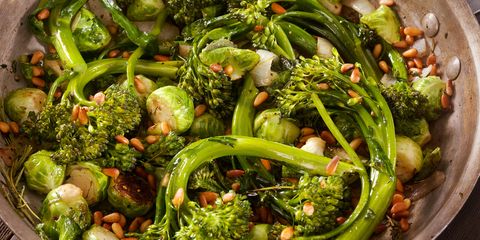
Popeye is notorious for showing off his massive biceps. His secret? Spinach. But that isn’t your only ticket to the gun show.
According to Rosanne Rust, R.DN., many vegetables provide you with two grams of protein per cup raw, or per half cup cooked. (So anything with two or more grams per serving can be considered a high-protein vegetable.)
It sounds underwhelming when you compare it to, say, the 31 grams of protein in a chicken breast. But the smaller amounts of protein in veggies can significantly contribute to your recommended daily intake if you aim for the recommended five to 10 servings a day.
However, there is a catch. “Plant proteins are ‘incomplete’ proteins, meaning they aren’t made up of all the essential amino acids,” Rust says. She says it’s important to make sure to “eat the rainbow” of veggies and grains to ensure you’re getting a variety of amino acids. (Translation: Don’t just eat tons of broccoli and call it a day.)
On your next grocery run, scan the produce aisle for these lean, green muscle machines.
1. Peas
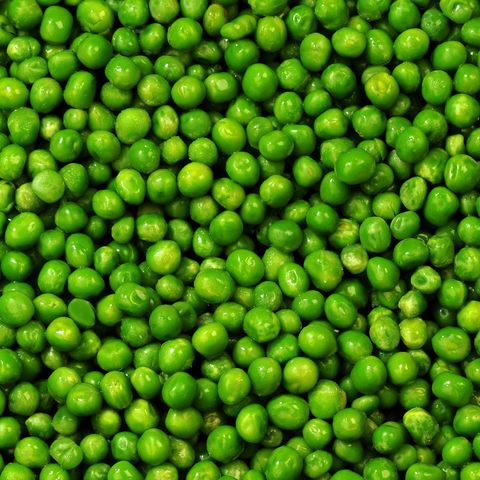
Getty Images
These literal pea-sized gems pack more than meets the eye. “Peas are loaded with vitamin A, a good source of potassium and fiber, and provide four grams of protein per half cup,” says Rust. “Steam them and toss them into pasta, rice, or salads.”
Per 1/2-cup serving: 59 calories, 0.3 g fat (0 g saturated), 10 g carbs, 4 g sugar, 4 mg sodium, 4 g fiber, 4 g protein.
2. Spinach
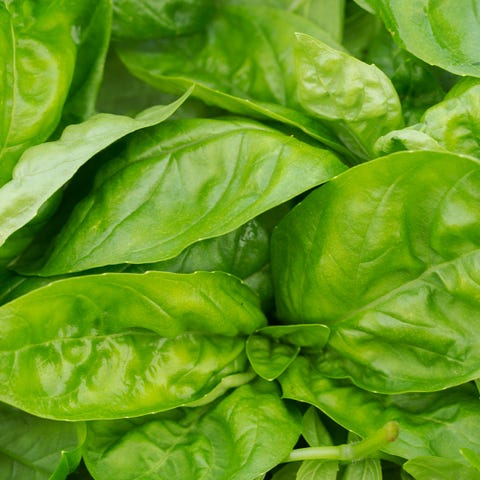
Getty Images
Loaded with vitamin C, folic acid, and other B vitamins, spinach provides a substantial amount of protein when cooked, says Rust. Try her yummy recipe of wilted spinach with pine nuts and zesty lemon.
Per 1/2-cup serving: 21 calories, 0 g fat (0 g saturated), 3 g carbs, 0 g sugar, 63 mg sodium, 2 g fiber, 3 g protein.
3. Baked potato
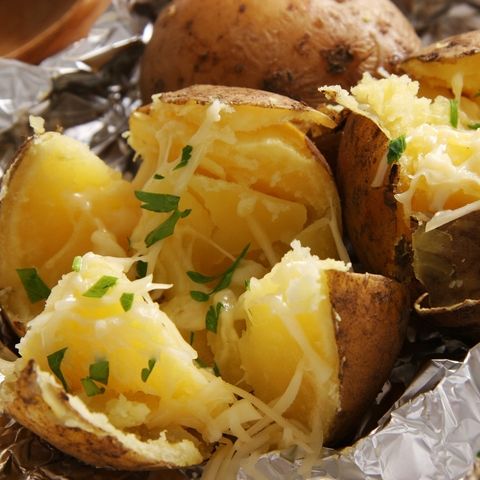
Getty Images
You’ll throw praise-hands emojis up at Mother Nature for this one: A medium-sized baked potato contains three grams of protein, tons of vitamin C, potassium and some filling fiber, says Rust.
Per medium potato: 145 calories, 0 g fat (0 g saturated), 34 g carbs, 3 g sugar, 8 mg sodium, 2 g fiber, 3 g protein.
4. Broccoli
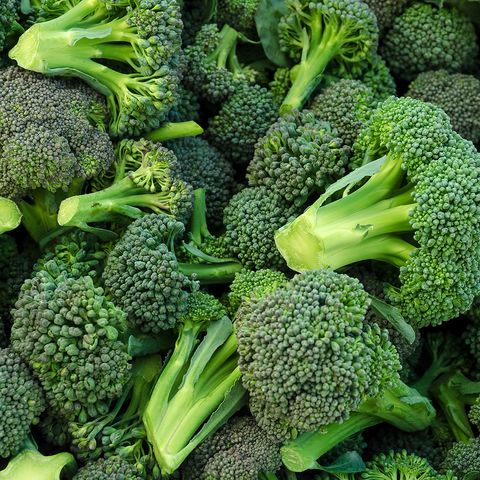
Getty Images
Your parents were onto something when they forced you to eat your broccoli as a kid. Now, you’ll want it all on your own—Rust says this cruciferous veggie isn’t only packed with essential nutrients, fiber and protein, but it’s great for maintaining proper gut health.
Per 1-cup serving: 31 calories, 0.3 g fat (0 g saturated), 6 g carbs, 2 g sugar, 30 mg sodium, 2 g fiber, 3 g protein.
5. Brussels sprouts
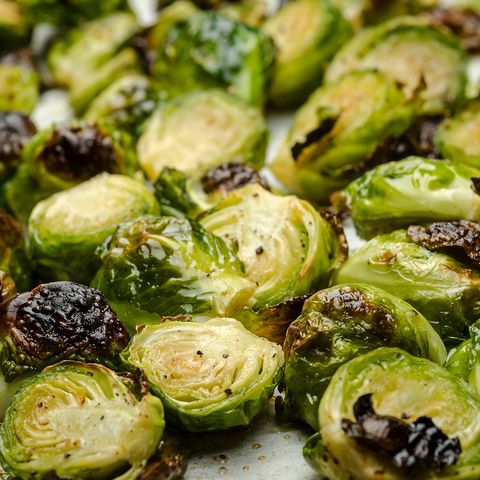
Getty Images
These little green guys used to get a bad rap, but now they’re cropping up on gourmet menus everywhere. Like broccoli, Rust says these cruciferous veggies are a great source of potassium, vitamin A, vitamin K, and fiber. Steal her simple sprout tip: Halve them, place them on a baking sheet, drizzle with olive oil, add a pinch of salt, and roast them for 25 to 35 minutes at 400 degrees, tossing once halfway through.
Per 1/2-cup serving: 28 calories, 4 g fat (0 g saturated), 6 g carbs, 1 g sugar, 16 mg sodium, 2 g fiber, 2 g protein.
7. Broccoli rabe
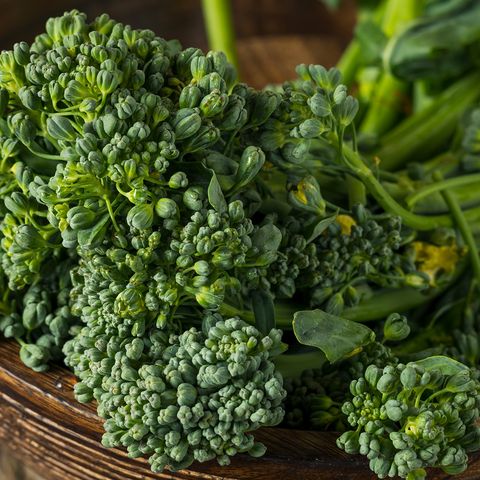
Getty Images
Rust predicts this leafy green with broccoli-like buds (also known as “rapini”) will be the next “it” vegetable, and for good reason: It boasts a surprising amount of protein, vitamin A, and vitamin K.
Per 85 g serving: 21 calories, 0 g fat (0 g saturated), 3 g carbs, 1 g sugar, 48 mg sodium, 2 g fiber, 3 g protein.
8. Corn
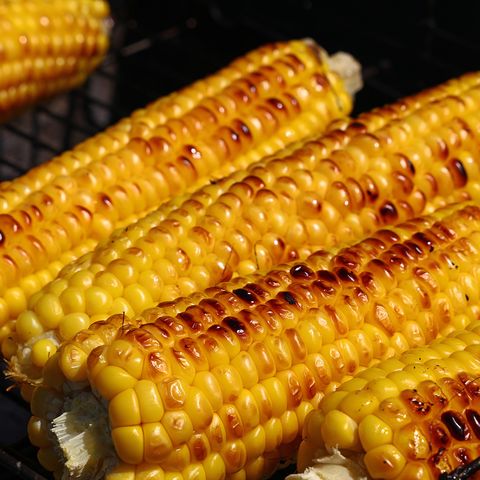
Getty Images
While field corn (fed to livestock animals) is considered a grain, the sweet corn we enjoy on the BBQ doused in butter is considered a vegetable, says Rust. And a surprisingly protein-loaded one, at that.
Per medium ear: 88 calories, 1.4 g fat (0 g saturated), 19 g carbs, 6 g sugar, 15 mg sodium, 2 g fiber, 3 g protein.
9. Portobello mushrooms
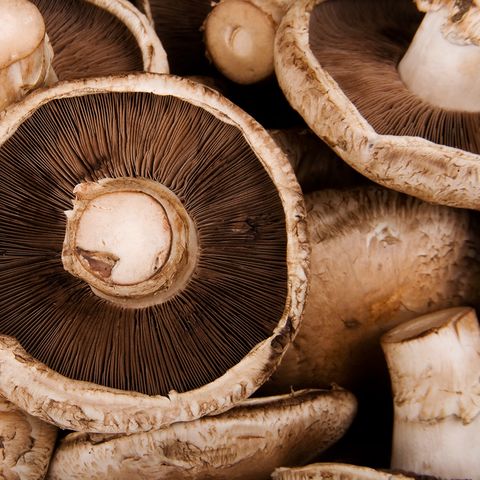
Getty Images
This fungi is packed with almost as much protein as an egg. Rust says it’s also high in fiber and loaded with antioxidants. “You can grill, chop, and sauté them using olive oil and a drizzle of balsamic vinegar at the end of cooking. You can also add them to a vegetable skewer to boost the protein,” Rust says.
Per 1-cup serving: 35 calories, 1 g fat (0 g saturated), 5 g carbs, 3 g sugar, 13 mg sodium, 2.7 g fiber, 4 g protein.
9. Lima beans
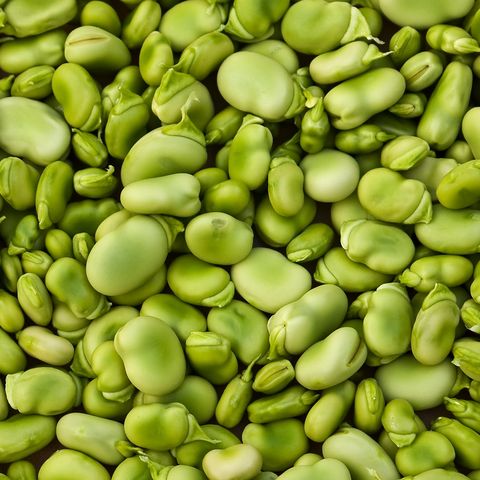
Getty Images
The combination of high fiber and high protein make these legumes (in this case, a veggie, too, says Rust) a satiating nutrient-filled powerhouse. To make a healthy homemade dip, Rust says to cook them in boiling water for 10 minutes, drain and cool, then transfer to a food processor, adding a clove of garlic, a tablespoon of lemon juice, two teaspoons of cumin and pinch of salt. Blend until smooth and serve with raw veggies or pita chips.
Per 1/2-cup serving: 105 calories, 0 g fat (0 g saturated), 20 g carbs, 1 g sugar, 13 mg sodium, 5 g fiber, 6 g protein.
Source: Read Full Article



